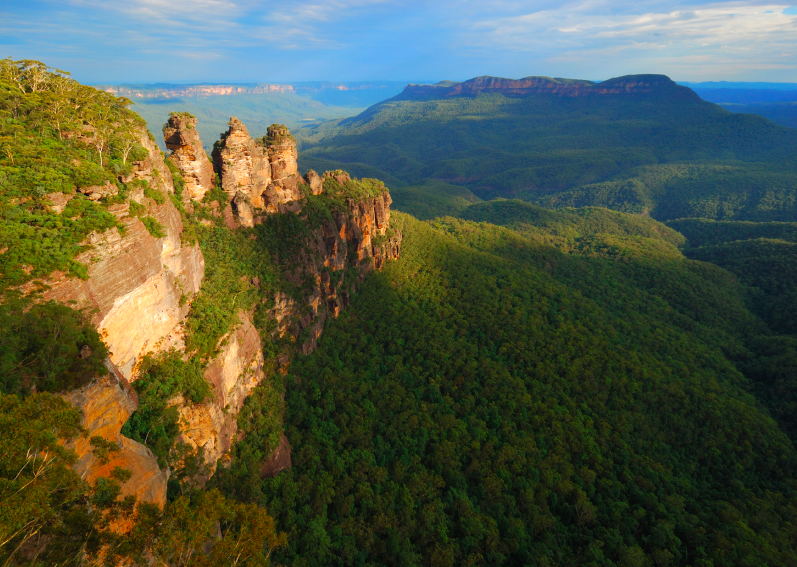The International Council on Monuments and Sites (ICOMOS) is gearing up to host its much-anticipated 21st General Assembly and Scientific Symposium in Sydney August 31 - September 9. Set against the breathtaking backdrop of the Greater Sydney Region, including the expanse of the Greater Blue Mountains World Heritage Area, this assembly is poised to become a hub of innovation, exchange, and collaboration. The overarching theme, "Heritage Changes," is a clarion call to examine the dynamic shifts shaping the 2020s and the pivotal role heritage plays in driving positive change and fostering a sustainable future.
Preserving the Past, Envisioning the Future
The 21st ICOMOS General Assembly and Scientific Symposium captures the essence of balancing heritage preservation with the aspirations of a sustainable tomorrow. Delegates from across the globe will congregate to share insights, exchange best practices, and engage in meaningful dialogues. The central theme will explore heritage as a force for change and a sustainable future, with symposium themes covering
Resilience
Central to this theme are the concepts of vulnerability, adaptability, and flexibility. Resilience, initially rooted in ecological and disaster risk domains, resonates deeply in the heritage context. As landscapes face the impacts of climate change, the dialogue will explore strategies to fortify the resilience of heritage sites. By investigating the interplay between attachment to place and strategies for adaptation and transformation, the discourse will shed light on heritage's role as a force for positive change.
Responsibility
The threads of leadership, sharing, and accountability weave together in the theme of Responsibility. Effective heritage management necessitates a shared commitment across communities, governments, and private sectors. Delving into the roles each stakeholder plays in responsible heritage management, climate adaptation, and social justice, this theme underscores the collaborative foundations necessary for heritage to flourish as a catalyst for change.
Rights
At the intersection of politics, ethics, and justice lies the theme of Rights. The recognition of heritage values as diverse, contested, and influential initiates a broader conversation about human and planetary rights. By exploring the intricate connection between heritage ethics and practice, the dialogue seeks to illuminate ways in which heritage, deeply intertwined with ethics, can drive transformative change.
Relationships
Connection, kinship, and respect form the core of the Relationships theme. This theme draws attention to the bonds between non-secular and sacred heritages and their associated communities. By dissecting the extent of interconnectedness and separateness between faith-based and Indigenous heritage sites, the conversation delves into collaborative possibilities. These discussions unveil ways in which faith-based communities, joined by shared heritage, can work as a potent force for change.
Exploring the Greater Blue Mountains World Heritage Area
Delegates attending the General Assembly will have the unique opportunity to immerse themselves in the natural wonders and cultural treasures of the Greater Blue Mountains with a series of walks planned by the NSW national Parks and Wildlife. The region's rugged terrain, lush forests, and awe-inspiring rock formations are not only a treat for the eyes but also a source of inspiration for those dedicated to heritage conservation.
The Greater Blue Mountains - A Unique Wonder at Risk
Yet, amid this splendour lies vulnerability.
Climate Change
Threatens the delicate ecology of the region
Increases risk of fire
Alters rainfall patterns resulting in landslides
Fire
Fire seasons are starting earlier and lasting longer
The scale and intensity of fires are increasing
Mega fires are threatening to destroy the biodiversity of the region
Urban Interface
Urban water runoff damages our water quality affecting vital ecosystems
Urban development and land clearing have resulted in habitat loss and the fragmentation of bushland
Invasive Species
Invasive predators like foxes and cats prey upon native animals
Weeds are strangling numerous ecosystems, altering their composition and function
Biodiversity Loss
The World Heritage Area supports about one-fifth of NSW’s threatened species, the Basalt Forest, Shale Cap Forest and Upland Peat Swamps are listed as threatened ecological communities in the Blue Mountains
A Call to Action
Inspired and powered by the themes of the 21st General Assembly we invite delegates, guests and interested others to join us in our work to protect this unique at risk environment. Become a Blue Mountains Guardian today and support vital research to protect the Greater Blue Mountains World Heritage Area.
